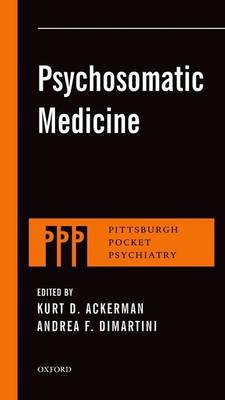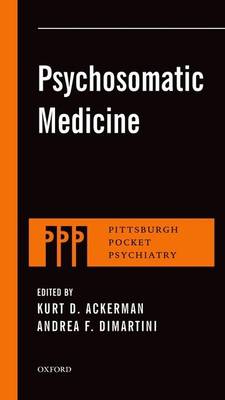
En raison d'une grêve chez bpost, votre commande pourrait être retardée. Vous avez besoin d’un livre rapidement ? Nos magasins vous accueillent à bras ouverts !
- Retrait gratuit dans votre magasin Club
- 7.000.000 titres dans notre catalogue
- Payer en toute sécurité
- Toujours un magasin près de chez vous
En raison de la grêve chez bpost, votre commande pourrait être retardée. Vous avez besoin d’un livre rapidement ? Nos magasins vous accueillent à bras ouverts !
- Retrait gratuit dans votre magasin Club
- 7.000.0000 titres dans notre catalogue
- Payer en toute sécurité
- Toujours un magasin près de chez vous
169,45 €
+ 338 points
Description
Psychosomatic Medicine (PM) is a rapidly developing subspecialty of psychiatry focusing on psychiatric care of patients with other medical disorders. PM specialists diagnose and manage psychiatric symptoms in a variety of medical settings, optimize their patients' medical care, and expand understanding regarding the role of psychological factors in health and disease. PM practitioners may function as psychiatric consultants in hospital-based wards, primary providers in med-psych units, or collaborative practitioners integrated with inpatient and outpatient medical teams. PM practitioners strive to stay current with the latest research and practice guidelines in a burgeoning field involving complex interactions and combinations of illnesses. To address these challenges, this book provides practical instruction from PM clinicians, educators and researchers, covering core clinical concepts routinely used in practice. Psychosomatic Medicine serves as an educational resource covering salient psychosomatic medicine topics for trainees and colleagues in psychiatry and other medical specialties. A history of PM contextualizes the field, and an overview of psychiatric consultation in the general medical setting emphasizes specifics of psychosomatic interviewing, physical examination, and collaboration with primary medical services. The remaining chapters cover the diagnosis and management of conditions commonly encountered by the psychosomatic psychiatrist: assessment and treatment of psychiatric disorders in a medical setting; assessment of decisional capacity; use of psychotropic medication in medically-compromised patients; management of delirium, cognitive and somatoform disorders; psychiatric manifestations of neurologic and other general medical conditions; emergent complications of psychiatric medication and illicit substance use; and special topics pertinent to PM. Finally, future directions in PM are explored in fascinating detail.
Spécifications
Parties prenantes
- Auteur(s) :
- Editeur:
Contenu
- Nombre de pages :
- 488
- Langue:
- Anglais
- Collection :
Caractéristiques
- EAN:
- 9780199329311
- Date de parution :
- 19-06-15
- Format:
- Livre broché
- Format numérique:
- Trade paperback (VS)
- Dimensions :
- 102 mm x 180 mm
- Poids :
- 340 g

Les avis
Nous publions uniquement les avis qui respectent les conditions requises. Consultez nos conditions pour les avis.






